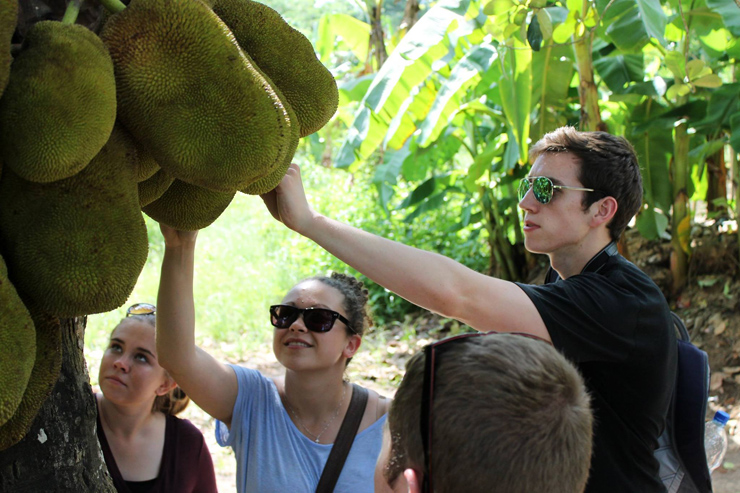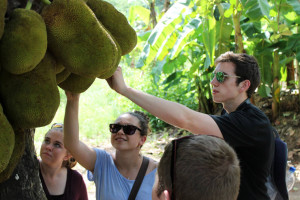

Student learn about the spice plants on Zanzibar.
By Kaye Burnet | News Editor
While many Duquesne students were getting ready to go home for the summer, nineteen students were instead packing their bags for a month-long trip to Africa as part of a new “Maymester” program.
The students lived in Tanzania, a country in East Africa, where they stayed with Spiritan priests, delivered donated vitamins, toured national parks and even went on a safari.
According to Gerald Boodoo, director of the Center for African Studies, it takes a “certain mindset” to study abroad in Africa, instead of more popular destinations in Europe.
“There are differences,” Boodoo said. “Difficulties with diet, temperature, culture. But every student I spoke with came away with a positive sense of these differences.”
Pope said he learned to appreciate the cultural differences between Tanzania and the United States.
“They are more religious there,” he said. “We went to a mass that lasted more than four hours, and we weren’t used to that.”
According to Boodoo, Tanzania is a heavily Muslim country, so students altered their wardrobes to meet different expectations of modesty.
“We had to be careful what we wore, out of respect,” Pope said. “Especially the girls. [Tanzanian] women were limited in what they could do.”
The students also traveled to Zanzibar, a collection of islands just off the coast of Tanzania. According to Boodoo, Zanzibar is famous for its spice trade. The Duquesne group had the chance to see where the spices and fruits were grown and sold.
“One of the plants was from India, and it was really spiky and kind of weird looking,” Pope said. “It tasted sweet.”
Other aspects of the Tanzanian diet include a heavy dependence on meats, Boodoo said, especially roasted goat.
“This kind of thing can be challenging for any vegetarians,” he said.
Another popular Tanzanian dish is ugali, a cornmeal porridge that accompanies many meals.
Jess Carrick and Horace Pope were two of the students who went on the trip, and they both recalled the ugali.
“We ate it almost every day,” Carrick said with a laugh. “I’ll always remember that taste!”
The trip was more than a tourism opportunity, Boodoo emphasized. Students took a photography class and studied theology to earn six academic credits.
“We designed this to be a balance,” Boodoo said. “We wanted students to have serious learning and fun encounters.”
Those “fun encounters” included a safari, a trip to the capital city of Dar es Salaam and an opportunity to interact with members of the semi-nomadic Masaai ethnic group.
“Their daily life is so different from anything we know,” Carrick said, noting how much work goes into tasks such as making a meal.
There is another Maymester in Africa being planned through the Office of International Programs for next spring, Boodoo said, but it will be held in Ghana to offer students a variety of African study abroad experiences.




